Curriculum Guide 2025-2026
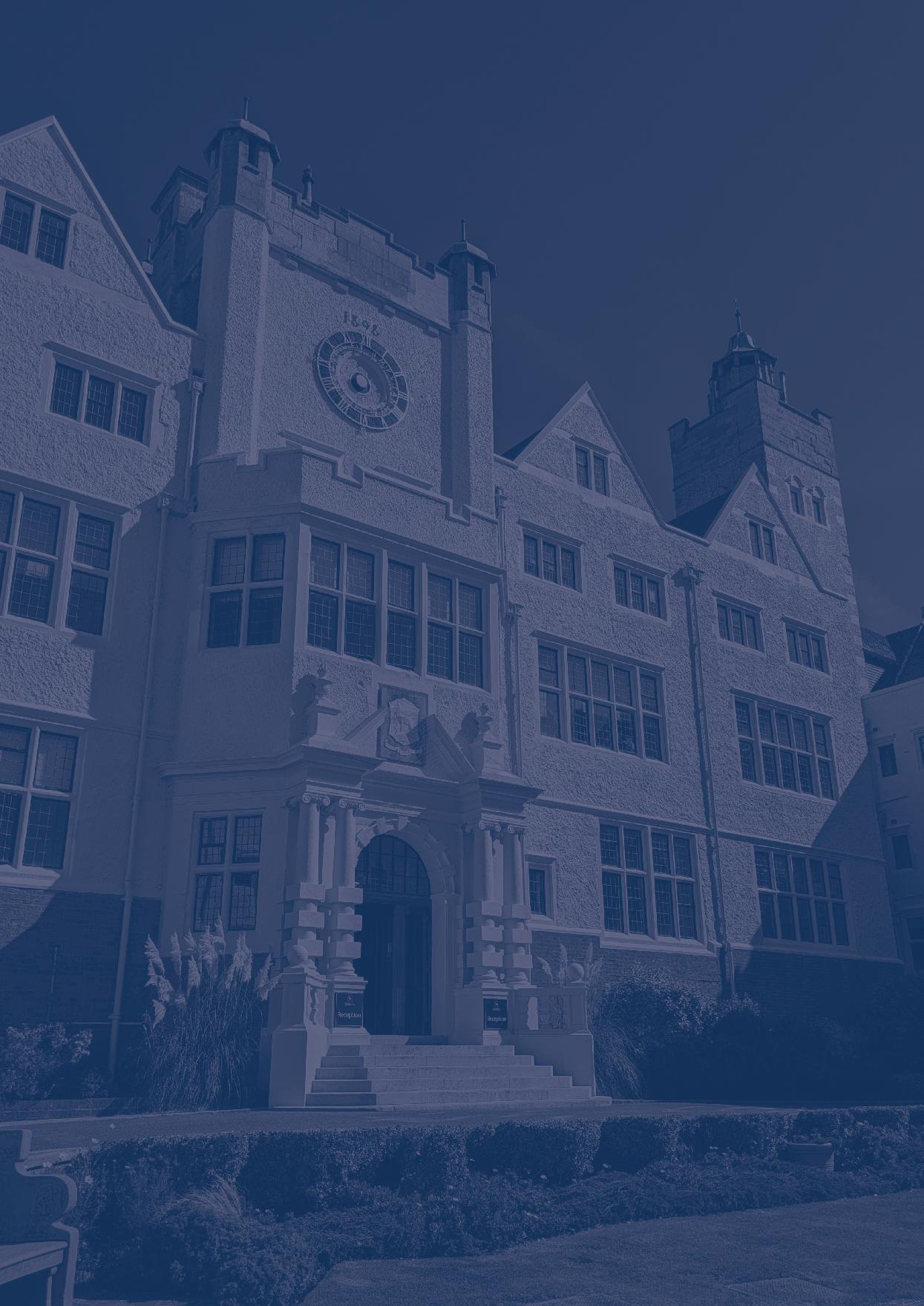
Girls First: Empowered, Encouraged, Engaged
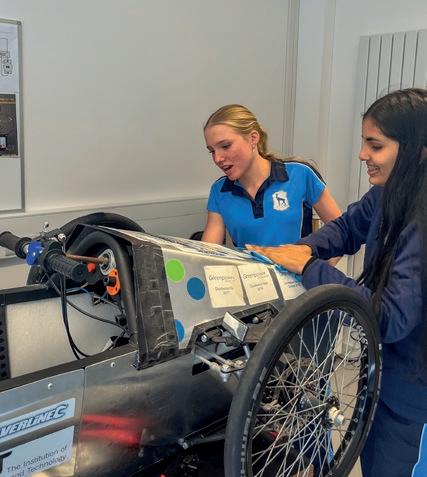
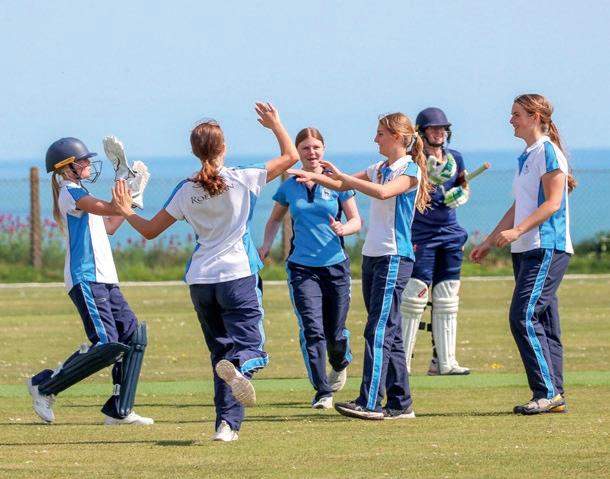
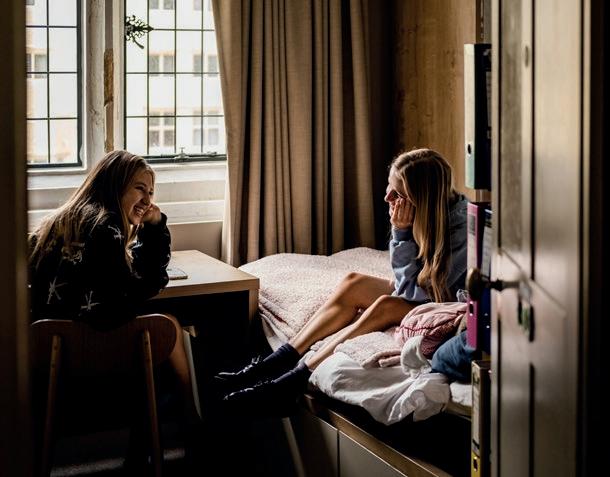
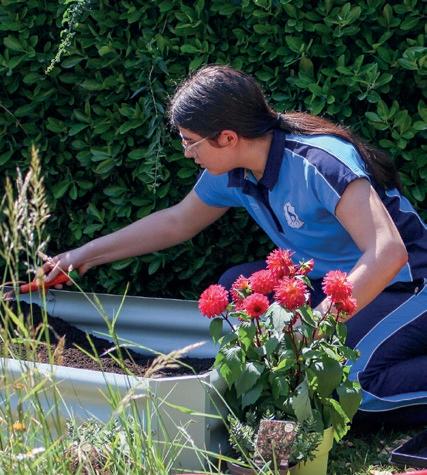
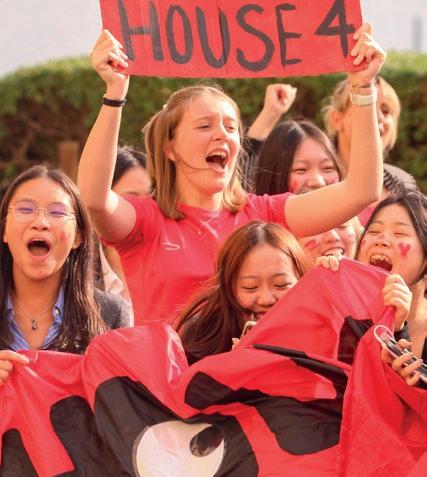
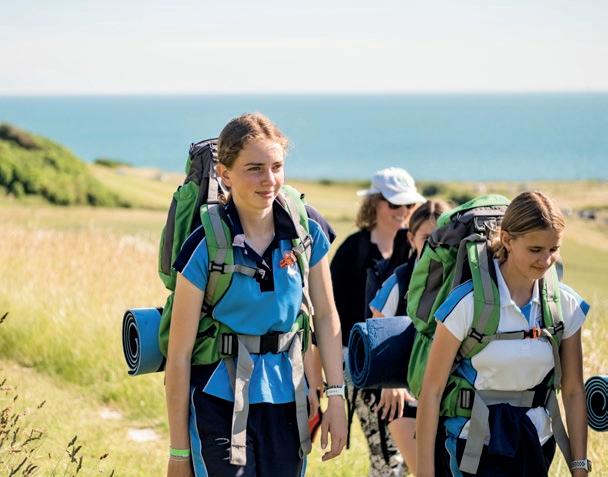
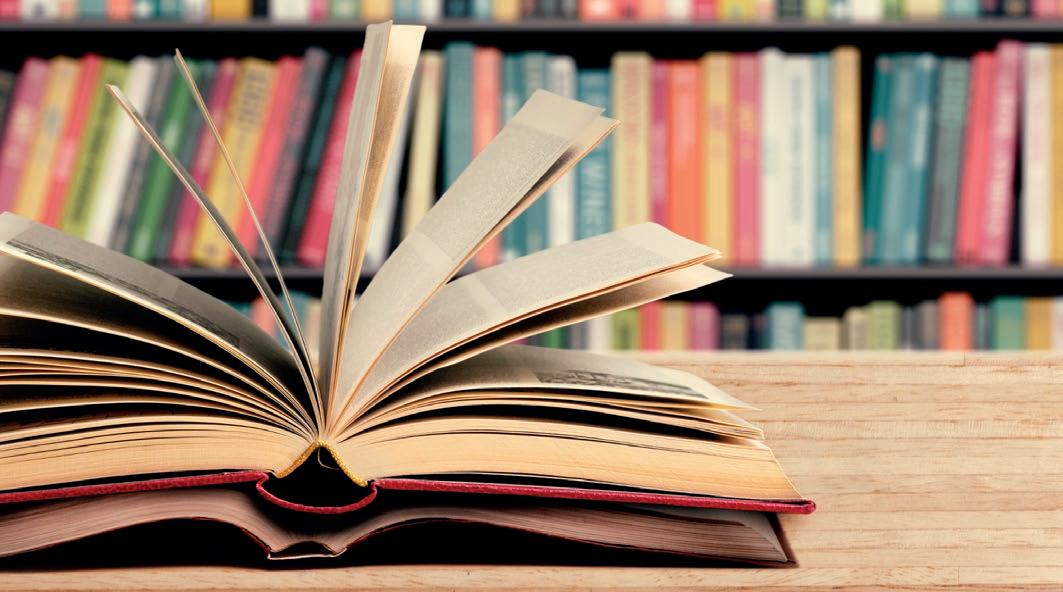

Curriculum Guide 2025-2026

Girls First: Empowered, Encouraged, Engaged







The GCSE years are a truly pivotal stage in a Roedean student’s journey. It is a time of exploration, growth, and exciting possibilities.
These two years mark the moment when girls begin to take greater ownership of their learning, carefully selecting the subjects that will shape their future pathways. At Roedean, we believe passionately in empowering our students to make informed, confident choices, and encouraging them to embrace new challenges with curiosity and ambition.
In our all-girls environment, every individual is supported to flourish, free from stereotype or limitation. We engage students not only in academic excellence but also in developing the broader skills, resilience, and independence they will need to thrive at A Level and beyond.
Choosing which subjects to carry forward is both a significant responsibility and an opportunity for self-discovery. That is why, at Roedean, this process is taken both seriously and sensitively. Each girl receives extensive, tailored guidance from her Year 9 tutor and Head of Year, helping her design a unique programme of study complemented by enriching co-curricular opportunities. For those joining Roedean at the start of the GCSE years, we provide additional support to ensure girls feel quickly welcomed, settled, and fully engaged in the academic and pastoral life of the school.
The GCSE curriculum at Roedean is far more than preparation for examinations, it is a foundation for future success, a springboard for passions to ignite, and a time when girls are empowered to take bold steps towards shaping their own futures.
At Roedean, students can choose from an impressive twenty-three subjects at GCSE, and they consistently achieve exceptional results.
Our consistently impressive results reflect the resilience, ambition, and hard work of our students, which is a true testament to their dedication and the academic excellence at the heart of Roedean.
Our Year 10 and 11 curriculum offers a rich variety of GCSE and IGCSE subject combinations. This allows each student to explore her interests, nurture her talents, and shape a programme of study that reflects her aspirations.
Please note that, occasionally, an option may not run if there is insufficient demand.
To ensure that the GCSE programme provides each student with a broad and balanced education, preparing her for A Levels, university, and adult life, most students will be expected to take the following subjects:
• An integrated English course (which results in GCSEs in two separate GCSE subjects: English Language and Literature)
• Mathematics
• Either the Combined Science route (which leads to two Science GCSEs, each in “Combined Science”) or the Separate Science route (which leads a GCSE in each of Biology, Chemistry and Physics)
• At least one from Geography and History
• At least one Modern Foreign Language from French, Russian and Spanish.
Students are expected to take one Modern Foreign Language to GCSE Level. We also welcome and strongly encourage dual linguists. The current GCSE syllabus emphasises relevance and accessibility.
Its key aims are:
• Developing understanding of the Target Language in a variety of contexts
• Transferable language-learning skills
• The ability to communicate effectively
It is recommended that students take a total of nine GCSEs, with ten only in exceptional circumstances or for those wishing to study Separate Sciences. Additional subjects should be selected from the list below to complement the core curriculum outlined above. These choices should be made carefully to reflect each student’s individual interests and future aspirations.
The optional subjects include:
• Art & Design
• Business
• Computer Science
• Dance
• Design & Technology
• Drama
• Latin
• Music
• Religious Studies
• Sport Science
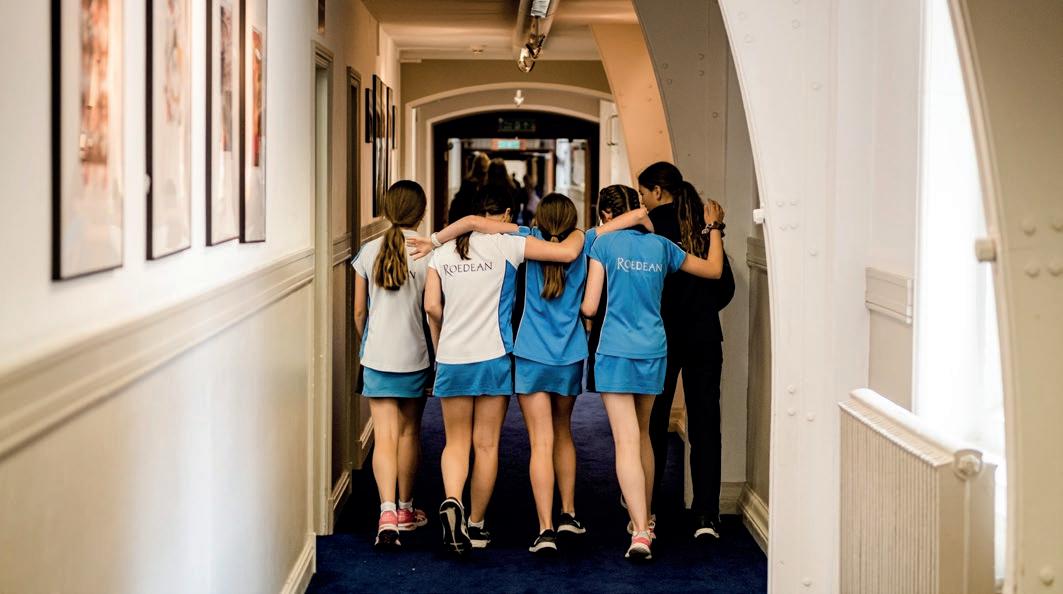
Personal Development (PD) at Roedean is a dynamic and an essential part of life in the GCSE years, supporting students in becoming confident, compassionate, and well-informed individuals.
Delivered by a specialist, experienced team of staff, the programme is designed to foster self-awareness, selfesteem, and a deeper understanding of other and the world around them.
The PD curriculum centres on three core themes:
• Health and Wellbeing
• Relationships and Sex Education
• Living in the Wider World
Each year’s programme is carefully crafted to meet students’ developmental needs, offering a rich blend of individual, pair, and group activities that encourage active participation and thoughtful reflection. The course is further enhanced by a range of expert speakers, from healthcare professionals to subject specialists, who bring fresh perspectives and real-world relevance to the topics explored.
With no formal assessment, PD offers a safe, open space for personal growth, helping students develop the values, knowledge, and life skills necessary to thrive at Roedean and beyond.
“PD lessons at school are entertaining and interesting as we get to learn things that we don’t learn in normal lessons. I think it is important because they are lessons that get us prepared for life after studies.”
Natalie
We believe leadership is about taking initiative, inspiring others, and making a positive contribution to the community.
In Years 10 and 11, students are encouraged to step into leadership through a range of opportunities both within their Houses and across the school. They might support younger students, help to organise events, or take on responsibilities that strengthen the sense of community and teamwork. These experiences allow them to develop confidence, communication, and collaboration skills, while learning to lead with empathy and integrity. By fostering leadership at this stage, we prepare our students to embrace greater responsibility in the Sixth Form and beyond.
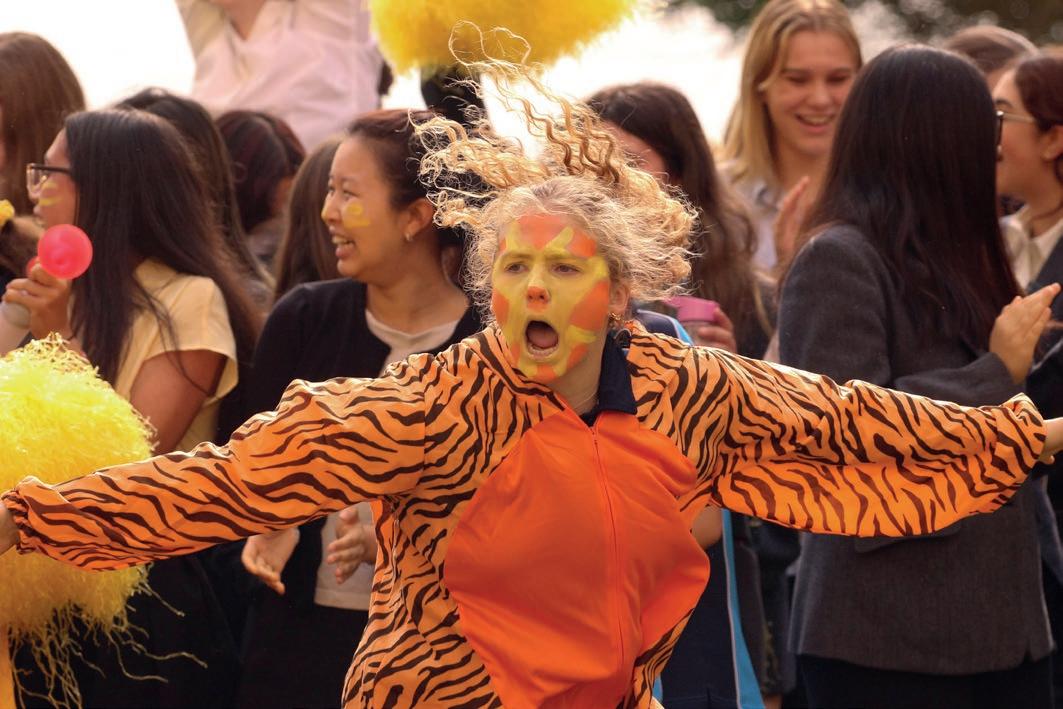
Pastoral care is at the heart of everything we do at Roedean, underpinning every aspect of school life and ensuring that each student is seen, known, heard, and feels that they truly matter.
We believe that when students feel valued and supported, they are empowered to flourish both academically and personally. Our strong and highly experienced pastoral team works seamlessly across the academic and boarding spheres, with Tutors, House staff, and dedicated Pastoral Managers providing a consistent network of care. This holistic approach means that every girl is known as an individual, with her wellbeing and personal development given as much priority as her academic success. By fostering a culture of kindness, respect, and open communication, we equip students with the resilience, confidence, and emotional intelligence to navigate challenges and thrive at school and beyond. At Roedean, wellbeing is not an addition –it is essential, and it lies at the core of the transformative education we provide.
Tutors and tutor groups are a central component of pastoral care. Each girl is placed in a small tutor group led by a dedicated Tutor who acts as the first point of contact for both the student and her parents. Tutors meet regularly with their tutees, offering guidance on academic progress, personal development, and wellbeing. They work closely with House staff and teaching colleagues to monitor each girl’s journey through the school, celebrating successes and providing timely support where needed. This personalised approach fosters strong relationships, builds confidence, and ensures that every student feels a sense of belonging within the Roedean community.
In Year 11, Tutors together with the Head of Year also play key roles in monitoring and supporting students to ensure they make strong academic progress, while also guiding them through the transition to Sixth Form. Each year, intensive study skills sessions are delivered by a specialist provider, offering valuable strategies to build confidence and prepare effectively for the summer exams. Maintaining self-belief and motivation during this important year is essential, and regular assemblies and tutor sessions provide opportunities for students to reflect on their successes, recognise the progress they are making, and set themselves ambitious, meaningful targets.
With a wide range of clubs, societies, and activities on offer, there is something to spark every passion and empower students to step beyond their comfort zones.
From music, drama, and dance productions to STEM clubs, debating, creative writing, and art, Roedean students enjoy countless opportunities to explore their talents and discover new passions. Sport is equally dynamic, with options ranging from traditional team games to sailing, fencing, yoga, and equestrian pursuits. Many girls choose to take on the Duke of Edinburgh’s Award, developing resilience, teamwork, and independence through volunteering, physical challenges, and expeditions. Others embrace the unique opportunity to join the Combined Cadet Force (CCF) at Lancing, where they cultivate leadership, discipline, and a strong sense of service.
During the GCSE years, students benefit from a rich programme of weekly lectures featuring inspiring guest speakers. Alongside these, academic seminars and studentled societies encourage exploration of interests beyond the curriculum. Roedean also offers Young Enterprise, the Duke of Edinburgh Bronze and Silver Awards, and CCF, enabling girls to develop real-world skills and confidence.
Roedean’s commitment to partnerships and community engagement further enhances the co-curricular landscape. Students are encouraged to support local charities, mentor younger pupils in partner schools, and contribute to initiatives with a global impact. Central to this ethos is the Roedean Diploma, which incorporates activities linked to Innovation, Impact, and Inspiration. It recognises students’ engagement across co-curricular activities, encouraging them to reflect on their experiences, set ambitious goals, and develop a portfolio of achievements. Exceptional commitment and growth are honoured with Distinction, acknowledging their dedication and contribution.
This holistic approach reflects Roedean’s “girls first” philosophy, empowering students to build confidence, embrace leadership, and prepare for success in every facet of life beyond school.
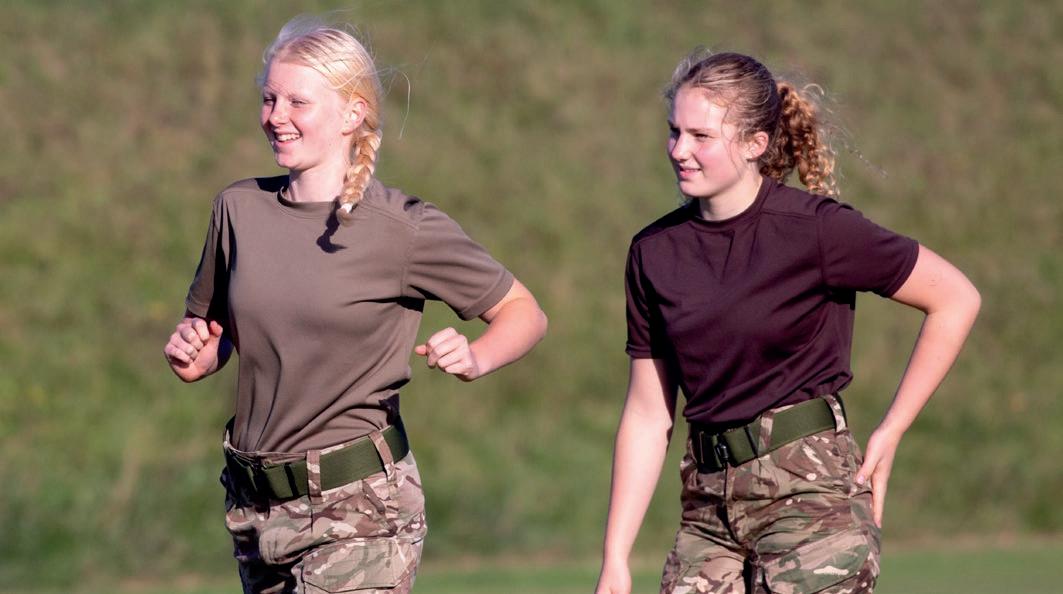
The future is full of possibility, and at Roedean we empower every student to dream boldly, explore widely, and step forward with confidence into the world beyond school.
We appreciate that the students’ education at school is a stepping stone to the rest of their lives. An outstanding education experience is much more than getting top grades. Through everything you do here, you will develop a real sense of who you might be in the future. Roedean students leave to study a wide range of subjects in Higher Education and Degree Apprenticeships with the best institutions in the UK and internationally. Expert advice at school to help make the best choices is complemented by mentoring from Roedean alumnae in your chosen field, and a bespoke careers programme that includes a work experience weekend.
At Roedean, Careers and university guidance starts early, so that the students can make informed choices con cerning their future direction long before they need to do so. The students have weekly careers and university guidance as part of Futures Fridays, as well as more detailed sessions as part of their Personal Development Programme. The Friday ‘working lunches’ provide regular opportunities for students to meet professionals from a range of industries. Students and parents are also able to arrange one to one meetings with a member of the Futures team or our independent careers advisor. If that all feels a little formal, you can drop in to our new Futures Hub any time to browse the resources available or to ask any questions you might have.
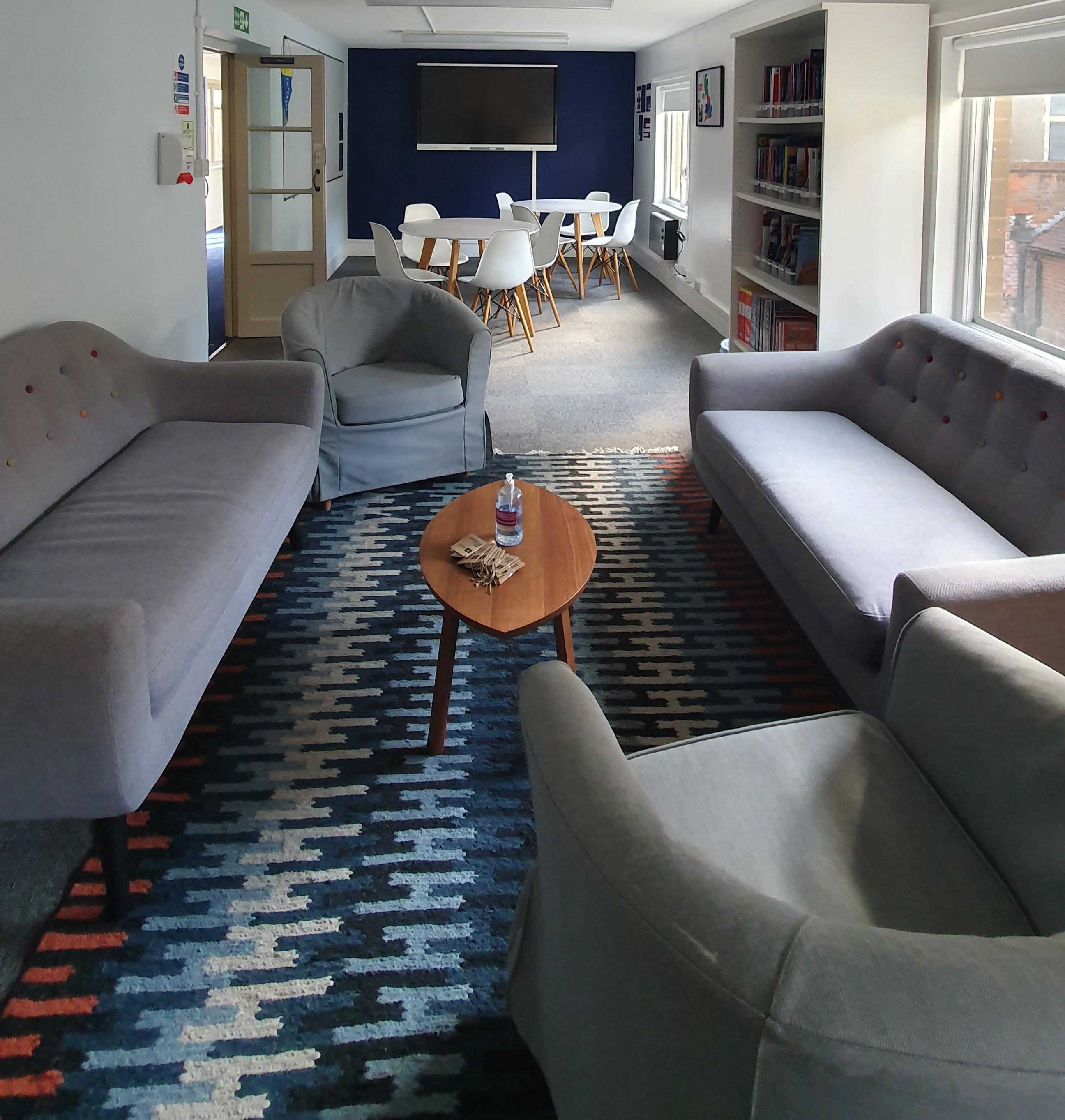
Head of Art Pathways:
Mrs S Strachan
Exam Board:
AQA 8201
At GCSE, students follow a dynamic and diverse course of study designed to develop a broad range of creative skills and processes. As they grow in independence and confidence, they are encouraged to explore thematic briefs in ways that reflect their individual ideas and to select the creative techniques they wish to pursue further. GCSE Art and Design at Roedean provides the ideal foundation for an exciting future in the Creative Industries.
The Art Department at Roedean is a vibrant hub of creativity and innovation. Each student is supported to develop personal responses that showcase her unique talents and interests. Highly experienced staff offer expert guidance, helping students navigate pathways towards further study and careers in creative fields. The department has an excellent track record of outstanding results and of supporting students in securing places on competitive courses.
Former Roedean students have gone on to successful careers in Set Design, Animation, Art Criticism, Fashion and Textile Design, Interior Design, Product Design, Art History, Art Direction, Architecture, Illustration and Graphic Design, Fine Art, and Curation.
In this course, you will learn and apply the necessary knowledge, skills and understanding in the field of 3-dimensional practice. This will help you to bring your personal ideas and design solutions to life, using a specific materials specialism. You will develop your ideas through drawing, CAD, modelling, and prototyping, while also taking constructional considerations into account.
The outcome should demonstrate your ability to imaginatively interpret your ideas and present them concisely.
The course begins with a foundation stage, enabling students to explore a wide range of creative processes, including painting and drawing, printmaking, sculpture and three-dimensional media, textiles, fashion design, and lensbased media.
Students are guided to investigate themes, respond creatively, and develop their ideas with increasing independence. By engaging with the work of artists and designers from contemporary practice as well as other times and cultures, they gain a strong critical and contextual understanding of the subject. Over the two-year course, students continually review and refine their work, building a portfolio of coursework that accounts for 60% of the final grade.
GCSE Art & Design encourages students to form their own judgements and nurtures the development of critical and analytical skills essential for further creative study.
Students take part in at least one full day trip each year to a major London art gallery, with an approximate cost of £50 per trip. In addition, there is the option to join an overseas residential art trip. Previous destinations have included Venice, New York, and Barcelona, offering students the opportunity to experience world-class art and culture first-hand.
‘GCSE Art is a subject that I would recommend taking as it is a personalised and independent experience, which in turn creates a unique journey in a student’s portfolio that caters to their interests. The art department along with its many teachers create a comfortable and warm atmosphere that allows you to relax and enjoy the lessons throughout the two years you would take the course. I love art and am looking forward to where it takes me.’
Head of Business Studies:
Mr
S Rowlands
Exam Board:
AQA 8132
Business is not solely a theory-based subject; students explore real-life businesses, many of which they already recognise. Through the study of Business, they investigate organisations and the global, ever-changing environment in which they operate. The course develops an understanding of the practicalities of running a business and explores the factors that contribute to success or failure.
Further Studies and Careers
It also provides valuable insight and a strong foundation for further study in areas such as Finance, Accounting, and related disciplines.
Students gain valuable skills in presentation, communication, problem-solving, teamwork, and leadership, all of which are highly transferable to a wide range of careers, including law, accountancy, business management, stockbroking, recruitment consultancy, marketing, and entrepreneurship. These skills also provide an excellent foundation for the further study of Business and Management.
‘Business GCSE not only introduces you to the basics of economics, planning and human resources but also uses realtime, relevant examples that build upon one’s awareness of the global world and the international market. A bonus for me personally would be that it taught me how to analyse and apply fitting information to my answers, giving me skills that I can use for my other subjects!’
Tamana

The Business course introduces students to key issues involved in setting up and operating a business. It examines business activities and the factors that contribute to success or failure. Students are encouraged to understand that businesses operate within society and must engage with a wide range of stakeholders, each with differing perspectives. As part of the course, they also study how businesses grow and the challenges that expansion can bring.
The course is assessed through two examinations at the end of the second year:
• Paper 1: Influences of Operations and Human Resource Management on Business Activity – 1 hour 45 minutes, 90 marks and account for 50% of the final grade.
• Paper 2: Influences of Marketing and Finance on Business Activity – 1 hour 45 minutes, 90 marks and accounts for 50% of the final grade.
Topic areas within the course include:
• Business in the real world
• Influences on business
• Business operations
• Human resources
• Marketing
• Finance
Optional Marketing & Branding Conference @ Disneyland, Paris

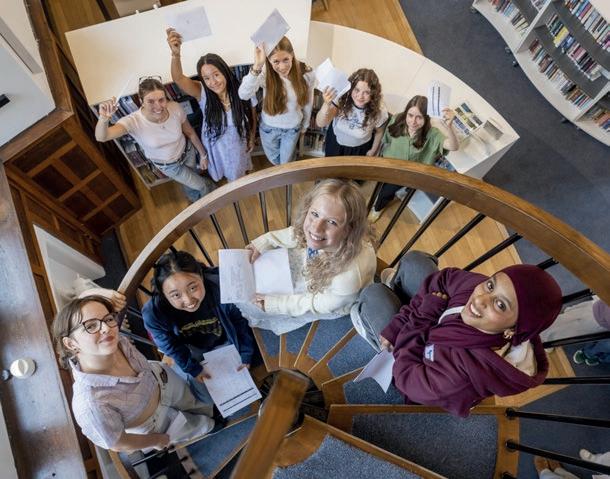
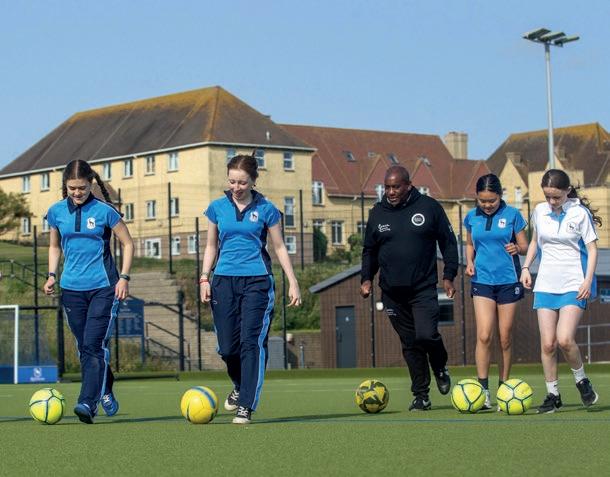


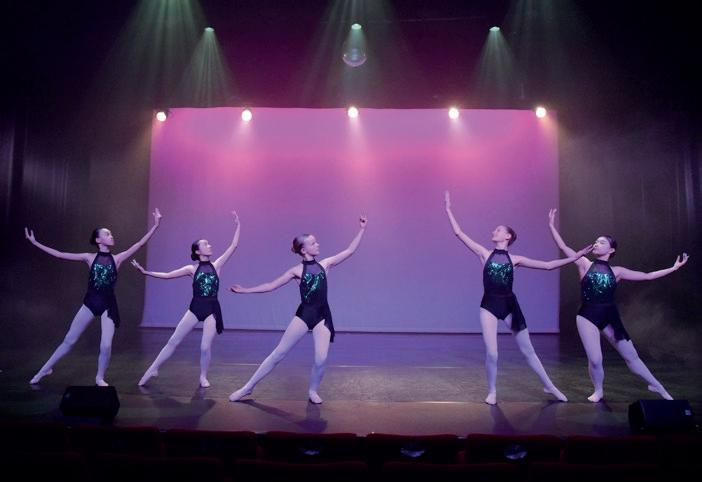
Lead teacher ICT:
Ms K Griffiths
Exam Board:
OCR J277
This is a course with real relevance in today’s world. While most students already have some familiarity with computers and related technologies, the GCSE Computer Science course provides a much deeper understanding of how computer systems work and offers insight into what happens ‘behind the scenes.’ A key element of the course is the study of computer programming, which helps students develop critical thinking, analytical, and problem-solving skills. Many find it an engaging and enjoyable way to build competencies that are transferable to other subjects and applicable in everyday life.
There are excellent opportunities for those who wish to excel in Computer Science, a subject that underpins much of modern society. In an age where everyone is a consumer of Computer Science and IT products, the course provides a strong foundation for further study and future careers.
GCSE Computer Science prepares students exceptionally well for higher education and employment in the field. With the increasing importance of information technology, there is a growing demand for professionals skilled in programming, cyber-security, and computational thinking.
Those who pursue this pathway will be well equipped to tackle technical challenges across diverse sectors, including Engineering, Finance, Resource Management, Science, and Medicine.
In the course you will learn the following skills:
• Recall, select, and communicate – Students will demonstrate their ability to recall, select, and effectively communicate their knowledge and understanding of computer technology
• Apply knowledge, understanding, and skills – They will apply their knowledge and skills to solve problems using computer programmes
• Analyse and evaluate – Students will develop the ability to analyse and evaluate information, make reasoned judgements, and present clear, well-supported conclusions
‘I love Computer Science because it allows me to think of different ways to solve the same problem: there is no one way to code as there are so many solutions which can lead to the same answer. I also love learning about technology and having the skills to code as our world is becoming more technologically advanced. I’m inspired by how quickly technology evolves each day and this motivates me to be part of its progress.’
The course is delivered through a creative blend of practical and theoretical lessons, providing students with a comprehensive understanding of Computer Science.
Component 01: Computer Systems – Exam account for 50% of final grade
In this unit, students explore how computers operate by studying essential hardware and software components. They learn how computers store various types of data, including text, images, and sound. The unit also covers different types of networks, examining their advantages and disadvantages, identifying potential security threats, and implementing appropriate security measures. Additionally, students consider the global impact of Computer Science by studying the ethical, legal, cultural, and environmental issues associated with computing technologies.
Component 02: Computational Thinking, Algorithms, and Programming – Exam account for 50% of final grade
This unit focuses on developing programming skills, with Python as the primary high-level language. Python is widely used by developers, data scientists, software engineers, and security experts due to its versatility and object-oriented features. Students learn to write, refine, test, debug, and execute code, building a strong foundation in computational thinking and problem-solving.
Practical Programming – Non-Assessment
The non-examined programming project takes place during timetabled lessons. Students select tasks from a set provided by the exam board, designing, developing, assessing, and evaluating their own programs. This practical work reinforces the skills and knowledge gained in the exam components and supports students’ overall understanding of the course content.
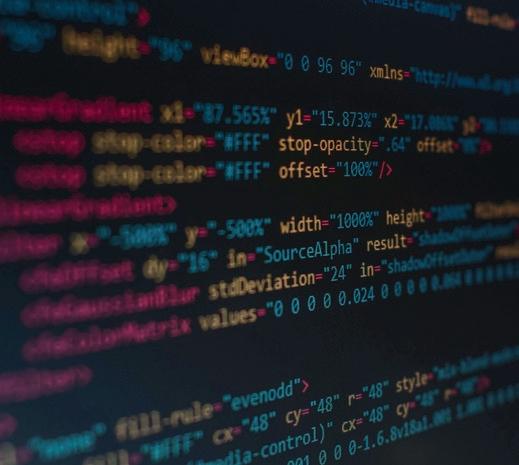
Students have the exciting opportunity to visit Bletchley Park, the historic site famously regarded as one of the birthplaces of computer science. Renowned for its crucial role in World War Two codebreaking, the visit offers insight into the work of Alan Turing, often hailed as the ‘father of computer science’, and his groundbreaking contributions to cryptography and computing.
Students are encouraged to participate in prestigious events such as the Perse Coding Competition and the Bebras Computational Thinking Challenge, which provide valuable opportunities to apply and extend their programming and problem-solving skills in competitive and collaborative environments.
Director of Drama: Mrs S Woodbridge
Exam Board:
AQA 8261
GCSE Drama is an excellent choice for students interested in exploring the theatre process, developing their performance, technical, and design skills, and building confidence as effective communicators.
While GCSE Drama provides a solid foundation for further study at A Level, it also serves as a springboard to a wide range of courses in the Arts and Humanities. The skills gained through Drama highly transferable and valuable for numerous university courses and future careers.
Further Studies and Careers
GCSE Drama requires students to work both independently and collaboratively, with much of the learning taking place through practical exploration. Teachers lead workshops focused on developing drama skills, experimenting with various theatre styles, and exploring the approaches of a diverse range of practitioners. While practical work is supported by relevant theatre theory, the course primarily celebrates Drama as a dynamic and creative art form.

The course is divided into three components:
Working collaboratively in a group, students will create an original piece of theatre using devising techniques inspired by companies such as Frantic Assembly or Paper Birds, responding to a chosen stimulus. They may select their preferred performance genre, including musical theatre, physical theatre, or documentary styles. Students can also choose a theatre role to specialise in, such as performer, lighting, sound, set, costume, or puppet designer. A written log supporting the performance will document the creative process from inception to completion.
Students will perform an extract from a play, guided by their teacher. They may choose to specialise in a theatre skill of their choice. The performance may take the form of a monologue, duologue, or a small group piece.
The written exam requires students to study and analyse a set play and to review live or digital theatre productions, developing their critical understanding of Drama as an art form.
Students can expect to visit the theatre at least twice a year, with trips ranging in cost from approximately £25 for local performances to around £60 for outings to London.
Head of Dance:
Miss S Abaza
Exam Board:
AQA 8236
GCSE Dance offers students the opportunity to work both creatively and independently in a challenging and exciting course. The balance between internally assessed practical tasks and a final written examination provides a wellrounded pathway to success.
While GCSE Dance provides a solid foundation for further study at A Level, it also equips students with a wide range of transferable skills and opens doors to diverse career opportunities.
Potential pathways include Performance, Teaching, Arts Administration, Choreography, Dance, Journalism, and many others.
GCSE Dance develops a range of valuable skills that are transferable to many other areas, including collaboration, creativity, problem-solving, confidence, and patience. Students cultivate these abilities by working both independently and collaboratively, creating choreography, and refining their performance skills. Additionally, the course enhances analytical and interpretive skills through the study and analysis of professional dance works.
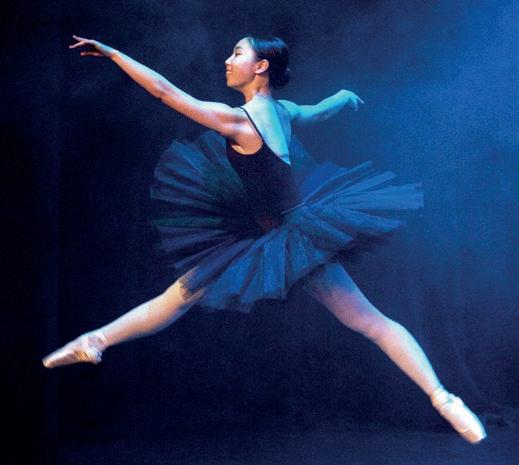
You will learn multiple skills in performance, choreography and analysing dance performances. You will learn how to choreograph and structure your own piece by understanding choreographic devices and processes. You will develop and improve your technique. You will gain presentation skills as well as build your confidence.
Component 1: Performance and Choreography (60% of final mark)
Performance:
• Two set phrases performed as a solo
• A duet or trio performance choreographed by the teacher
Choreography:
• A solo or group piece choreographed by the student in response to a stimulus set by the exam board. This can incorporate any dance style or a fusion of styles.
Component 2: Dance Appreciation (Written Exam) (40% of final mark)
• Section A: Assessment of knowledge and understanding of performance and choreographic skills.
• Section B: Analysis of the student’s own choreography and performance skills related to the solo and trio pieces.
• Section C: Analysis of production features in relation to the stimuli and choreographic intentions of six professional dance works. Students will be assessed on four of the six pieces from the dance anthology.
Head of DT:
Miss H Quirk
Exam Board:
AQA 8552
Design and Technology is a creative and diverse subject that enables students to engage in an iterative design process, providing opportunities to investigate, design, and create products that address real-world wants and needs. Throughout the course, students explore both theoretical and practical aspects of design in a stimulating and creative environment. Innovative thinking is encouraged through hands-on work with a variety of materials, tools, and equipment in the workshop.
The subject’s broad scope and depth connect strongly to a wide range of career paths, including Engineering, Architecture, Interior Architecture, Product Design, Project Management, Manufacturing, and Sustainability.
Design and Technology cultivates an eye for detail and sharpens problem-solving skills. It also fosters essential life skills and personal qualities such as divergent thinking, risktaking, and entrepreneurship. The course reinforces students’ scientific and mathematical knowledge while offering opportunities to work creatively and develop original products alongside passionate designers and makers.
• Autumn Term - Day trip to the Design Museum, London, including a hands-on materials workshop
• Spring Term - One-day silversmithing workshop led by a professional silversmith
• Summer Term - Day trip to the Victoria and Albert Museum, London, exploring the Design 1900–Now exhibition
Year 10:
• Developing an initial idea through to a completed product
• Gaining knowledge of various materials, including wood, metal, plastic, paper, card, textiles, and composites
• Acquiring manufacturing skills using these materials, including Computer-Aided Design and Manufacture (CAD/CAM) techniques such as laser cutting and 3D printing
• Understanding systems, structures, and mechanisms
• Applying design skills and strategies to create original, functional, and innovative designs
• Exploring broader issues in Design and Technology, including ways to enhance existing designs for both people and the planet
Year 11 – Coursework Project and Final Examination:
Students will apply their skills to develop a project for coursework, which accounts for 50% of the final mark. In response to a context set by the examination board, students will research, design, and create a prototype product. During the Autumn term, they will investigate the context and evaluate users’ wants and needs to inform the design development. In the Spring term, students will manufacture, assess, and evaluate their project.
Throughout this process, students will learn to navigate material limitations, resolve design challenges, and balance functionality with aesthetics. Assessment will focus on the depth of research and planning, craftsmanship in constructing the final design, and the extent to which the product meets its intended objectives.
The written examination at the end of the Year 11 accounts for the remaining 50% of the grade. This exam assesses knowledge and understanding of technical principles, design methodologies, and making processes. It also covers broader topics such as innovations in new materials and the increasing importance of sustainability and environmental responsibility in Design and Technology.
Head of English:
Mr
D Woodhouse
Exam Board:
4EA1/4ET1
English is an essential subject for many reasons. It develops students’ ability to communicate effectively, broadens their vocabulary, and teaches them how to adapt their language to suit different social contexts. It also enhances their capacity to express ideas clearly and organise thoughts logically, which strengthens their ability to process complex information and draw sophisticated conclusions.
Additionally, the course prepares students for A Level study by introducing key critical theories that have shaped modern thought, such as feminism, Marxism, and psychoanalysis. It encourages students to consider texts and their authors as products of the historical and cultural contexts in which they were created.
Studying English opens a wide range of university courses and career opportunities.
As a facilitating subject, it provides a strong foundation for further academic study, while also developing skills that are especially relevant to careers in journalism, writing, communications, international relations, and education.
‘For me, English at Roedean was incredibly fun. I was privileged to have such great teachers supporting me every step of the way. I was also able to find myself in my writing and learn new skills applicable to my everyday life. I want to say thank you to my English teachers at Roedean - they have made me into the person I am today!’
Alice
At Roedean, it is recognised that teenagers are often deeply engaged with current issues, politics, and debates. This subject provides a platform for students to explore some of the most relevant, topical, and thought-provoking themes. Students are encouraged to pursue topics that genuinely interest them, allowing for personal engagement and exploration.
Success in English does not require being an avid reader, although that can be beneficial. The department strives to inspire a love of literature while equipping students with the technical skills needed to think critically and write effectively about the work of diverse and renowned authors from across the world.
In English Language, students study a variety of non-fiction texts, including an unseen non-fiction text, alongside a section focused on producing writing within a non-fiction genre. The coursework comprises two pieces: one combining the analysis of poetry and prose, and another consisting of an extended imaginative writing task.
For English Literature, students engage with a literary heritage text as part of their coursework, a further prose text examined in the final assessment, and an additional drama text for coursework. These texts may include classic novels such as Great Expectations, Pride and Prejudice, Of Mice and Men, To Kill a Mockingbird, and Roll of Thunder, Hear My Cry. Drama texts might include plays like Romeo and Juliet, Macbeth, and An Inspector Calls. Students also study a selection of poems linked by a common theme, which forms part of the examination. Wherever possible, texts are experienced through live or recorded performances to enhance understanding and appreciation.






Faculty Lead: MFL/ Head of French:
Mr J Sampieri
Exam Board:
Edexcel IGCSE 4FR1
French is one of the most widely spoken languages worldwide, offering a valuable advantage for travel, study, and future careers. As the international language of cooking, fashion, and the visual arts, French enables students to connect globally and explore diverse cultures.
Universities and employers highly value language skills. Wherever their paths lead after Roedean, proficiency in French enhances applications in competitive fields.
Language skills are beneficial in a wide range of careers, including Engineering, Business, Law, Education, Travel, Publishing, and Diplomatic Service.
Learning languages offers countless benefits, enhancing self-confidence and supporting learning across the curriculum. Developing the ability to communicate in a different language has been proven to strengthen memory, multitasking, and problem-solving skills. In today’s globalised world, language skills provide a significant advantage in the job market, with research in 2021 showing that around 90% of employers seek a multilingual workforce. French is a skill for life, and students are encouraged to make it one of theirs.
Topics include:
• Home and abroad
• Education and employment
• Personal life and relationships
• The world around us
• Social activities, fitness, and health
Students will develop their skills across the four key areas of language learning: Speaking, Listening, Reading, and Writing. Each skill is equally weighted, with all four assessed through terminal examinations, contributing 25% each to the final grade.
• Reading: Students will learn to understand and respond to written language, demonstrating comprehension through written answers.
• Writing: They will develop the ability to communicate effectively in writing, using appropriate register, a wide range of vocabulary, and accurate grammar and structures as prescribed in the specification.
• Listening: Students will work on understanding and responding in writing to spoken language in a variety of contexts.
• Speaking: They will practise communicating confidently and fluently in spoken French, using accurate vocabulary and grammar within different situations.
A trip to Paris for French IGCSE and A level students is proposed for February half term for 4 nights and 5 days. The cost is estimated at £800.
‘Learning French has been one of the best decisions I’ve made - it’s fun, expressive, and opens doors to so many cultures. The lessons are empowering, we’re always speaking and thinking on our feet. It’s not just about textbooks; it’s about real conversations, worldly topics and growing your confidence. French is powerful, exciting, and your passport to the world; say yes to it!’
Head of Geography:
Mr G Carter
Exam Board:
AQA 8030
‘The study of geography is about more than just memorizing places on a map. It’s about understanding the complexity of our world, appreciating the diversity of cultures that exists across continents. And in the end, it’s about using all that knowledge to help bridge divides and bring people together.’
President Obama
Geography is a highly relevant subject that encourages students to engage with some of the big questions facing the world today. It offers a wide-ranging, exciting, and thought-provoking curriculum, providing a balanced framework of physical and human geography while exploring the connections between them. Students will also conduct investigations at a variety of scales, developing a deep understanding of local, national, and global issues.
Geography has become a growth subject at Roedean, with the GCSE cohort increasing from 30 students five years ago to 80 students today, and A Level numbers rising from 3 to 11 over the same period. Results continue to strengthen, with over 80% of GCSE students achieving Grades 7–9 in 2024.
A successful geographer is inquisitive, critical, analytical, logical, and resourceful. They recognise that there is rarely a single cause behind events and develop the skills to prioritise and evaluate the factors contributing to them.

Within the course, students explore the processes responsible for shaping our ever-changing landscapes. Through a balance of both Physical and Human Geography, they examine the complex interconnections between environments and the diverse ways humans interact with them. Topics of study include climate change, development, urbanisation, natural hazards, coasts, ecosystems, global shifts in economic power, and the challenge of sustainable resource use. Students are encouraged to reflect on their role in society by considering a range of viewpoints, values, and attitudes.
GCSE Geography includes a compulsory fieldwork element, which is assessed in Paper 3 of the final examination. To meet this requirement, Year 11 students take part in a twonight residential trip over a weekend in late September. In recent years, students have visited the Calshot Centre at the mouth of Southampton Water, where they carry out their geographical field investigations alongside a range of exciting outdoor activities provided by the Calshot team. The cost of the weekend is approximately £350.
‘GCSE Geography has a real sense of fun laced into all of the lessons. Every class has interesting and relevant content and always the opportunity to get involved; from pop-up quizzes to active fieldwork - like the recent multi-activity Geography field trip to Calshot. Geography was a super GCSE choice.’
Freya
Head of Geography:
Ms G Benton-Stace
Exam Board:
1HIO
History is a dynamic and thought-provoking subject that helps students understand the world and their place within it. By exploring key events, people, and ideas from the past, students develop a deeper appreciation of how historical forces have shaped societies, cultures, and global relationships. The study of History at GCSE level encourages curiosity, critical thinking, and the ability to analyse complex information, preparing students to make informed judgements about the world today.
Many students from Roedean choose to continue to study History, or a related subject such as Archaeology or International Relations. At university, History is a highly respected subject and a significant gateway to a full range of academic pursuits and careers, such as Law, Journalism, Civil Service and Diplomacy.
Studying History develops empathy and tolerance, as well as strong organisational skills, intellectual rigour, and advanced literacy. It also provides highly transferable skills and creates valuable links to a wide range of other academic disciplines.
There are no compulsory trips for this course; however, optional excursions may be offered, such as visits to the Old Operating Theatre in London, the French and Belgian battlefields, or Berlin.
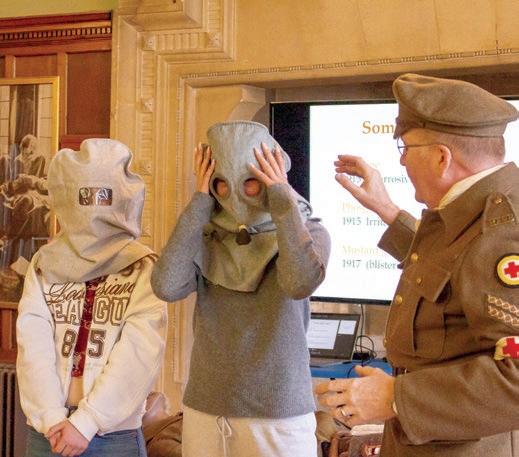
Students begin with a thematic study of Medicine Through Time (1250 to the present day), including a focused investigation into the development of the Western Front during World War One. In the second half of the year, they undertake a modern depth study on Weimar and Nazi Germany (1918–1945).
The Autumn term focuses on a period study of Superpower Relations and the Cold War (1941–1991), followed by a British depth study of the reign of Elizabeth I in the Spring term. This course structure provides both breadth and depth: it spans the history of medicine from the medieval period to modern times while allowing students to explore Germany and the Cold War in detail. The unit on Elizabeth I offers excellent preparation for A Level History, where modules include the mid-Tudor crises and the Elizabethan era.
‘I chose to study History because I always love to find out more about the past and how it relates to the current world. History shapes our society and is continuously changing the world around us. Through the GCSE course, I get to learn explore topics like medicine, Germany, the Cold War, and the Elizabethan era. In addition to this, I can also develop my writing and analytical skills.’
Candis
Head of Classics:
Mrs C Allen
Exam Board:
OCR J282
GCSE Latin is an engaging and intellectually challenging course that offers one of the most diverse ranges of content and skills. It is unique among GCSE languages in including the study of literature at this level. Classes are typically small, providing individual support within a vibrant department that offers a wide range of co-curricular opportunities, including overseas trips, theatre visits, and archaeological sessions. The subject is dynamic and enjoyable.
Students who continue with Latin and Classical Civilisation at A Level often go on to study Classics or related subjects at university. The transferable skills gained through Latin support success across many academic disciplines.
This qualification is highly respected by employers across numerous prestigious fields such as Law, Medicine, Veterinary Science, Journalism, and Politics.
Latin is highly regarded due to its challenging and broadranging nature. Students develop skills in precision, logic, communication, literary criticism, source analysis, and evaluation. The subject is truly cross-curricular, with content and skills that intersect with art, philosophy, linguistics, literature, history, archaeology, and religion, among others. As Latin is not widely studied across the UK, taking this subject provides students with a distinctive academic advantage.
Students will sit three papers:
• One language paper worth 50%
• Two literature papers on original Latin texts, each worth 25%
The compulsory language paper assesses the translation of short passages into English, followed by comprehension questions, or the translation of short sentences into Latin. Students who have studied Latin previously, whether at Roedean or elsewhere, will have made a strong start on the GCSE grammar and vocabulary. A vocabulary list is provided, with learning completed by the end of Year 10.
The literature component includes original Latin prose and/ or poetry, which students learn to analyse and appreciate. Responses to questions about content and style are written in English. These modules are covered in detail over the twoyear course, preparing students thoroughly for the literature aspect. The course is linear and builds on prior knowledge.
The Classics department is renowned for its foreign travel opportunities, offering an annual trip to Italy or Greece to enable students to experience aspects of the ancient world firsthand. Additionally, the department takes full advantage of its proximity to London’s extensive collections of Roman artefacts, and all GCSE Latin students are invited to join the trip to the British Museum. When relevant theatre productions are running in Brighton or London, GCSE students are also encouraged to attend these performances to enrich their understanding.
‘I enjoy Latin GCSE as the problem-solving skills it gives you are very useful. As well as this, Latin links to many other languages and has many English derivations making my other subjects more interesting. I have also enjoyed the literature aspects of Latin GCSE, particularly translating the set texts as this is a new experience which is very different to other GCSEs.’
Anya
Joint Heads of Maths:
Mrs J Hopper
Mr A Lutwyche
Exam Board:
Edexcel IGCSE 4MA1 (International GCSE A)
The study of Mathematics encourages rational thinking and helps develop an understanding of the world around us. The department aims to foster intellectual curiosity and equip students with the skills needed to analyse and solve problems accurately and efficiently. A deep understanding of Mathematics is highly sought after when applying for university courses and careers.
Mathematics lessons at Roedean encourage students to explore different approaches, whether or not they initially lead to success. Experimenting with various methods helps students move closer to a complete, correct solution and fosters a deeper comprehension of the material. The skills developed and refined through this process build resilient problem-solving techniques that can be applied beyond Mathematics.
GCSE Mathematics is essential for entry into any UK university and provides a strong foundation for students wishing to progress to A Level Mathematics and Further Mathematics.
Throughout the course, students will develop knowledge and understanding of mathematical concepts and techniques, building a strong foundation of skills for further study in Mathematics or related fields. They will gain confidence in applying mathematical methods to solve problems and develop an appreciation for the importance of Mathematics in society, employment, and academic study. Wherever possible, the course connects mathematical ideas to realworld scenarios, helping students fully grasp the relevance and significance of each concept.
While the curriculum materials are taught thoroughly, teachers may extend ideas beyond the course requirements where appropriate, encouraging discovery and curiosity to enrich lessons. For students planning to continue Mathematics beyond GCSE, this approach provides a strong foundation of knowledge to build upon in the Sixth Form. For those not intending to pursue Mathematics beyond Year 11, the skills developed remain valuable and applicable across many other fields of study.
The key areas of Number, Algebra, Data, and Geometry are all covered, with many concepts from Key Stage 3 expanded upon and new topics introduced throughout the GCSE course. The IGCSE Mathematics examination consists of two papers, each lasting two hours, with calculators permitted in both. Some of the more advanced students may take their IGCSE Mathematics exam in November of Year 11 and then progress to the AQA Level 2 Further Mathematics qualification. This qualification serves as an excellent bridge between IGCSE Mathematics and A Level Mathematics, expanding on more complex topics and introducing new concepts. While Further Mathematics is not a requirement for those choosing A Level Mathematics, it provides a valuable preview of the challenges ahead; however, students who have not taken the Further Mathematics course are still able to choose to Mathematics as one of their A Levels and experience success.
There are no compulsory trips in Mathematics.
All students are expected to bring a geometry set (including protractor, compass, ruler, pencil, rubber) and a scientific calculator and a positive mindset to every lesson.
‘At Roedean, Maths lessons aren’t always about what we know or have to know, we are able to think further and see how it applies in the real world; I find my lessons enjoyable and always find myself waiting for the next lesson!’
Derin
Director of Music:
Mr B Rous
Exam Board:
AQA 8271
Music is a distinctive, challenging, and enjoyable subject. In addition to enhancing musical skills, it fosters selfconfidence, self-discipline, presentation abilities, and teamwork through opportunities to perform both solo and collaboratively. These transferable skills are highly valued in the workplace. Furthermore, studying Music develops an understanding of the importance of continuous evaluation and refinement within any process. The subject also nurtures qualities that future employers value, including creativity, problem-solving, initiative, presentation skills, and the ability to collaborate effectively.
As a multi-faceted discipline, Music provides an excellent foundation for a wide variety of careers, not only within the arts but also in fields such as Architecture, Accountancy and Finance, Business, Classics, Dentistry, Education, Law, Medicine, Modern Languages, and Therapy, all of which have been chosen by Roedean musicians as degree pathways.
Students who opt for Music are likely to enjoy a wide range of musical styles and will have a genuine desire to develop as musicians by extending and refining their skills. They will be required to perform, either as instrumentalists or singers, with performances varying greatly in style and format.
Musicians are natural multi-taskers, and the study of Music is highly regarded for its intellectual, creative, and personal development benefits. This form of education nurtures vital qualities that benefit students across all future career paths. Musicians are not only collaborative team players but also demonstrate self-discipline, dedication, and a strong work ethic.
GCSE Music focuses on making and listening to music, with a balance of performing, composing, and listening across a wide variety of musical styles, including popular music, world music, and classical music. Students develop the ability to write, perform, and appraise music critically.
The coursework element includes both performing and composing. Students are required to perform one solo piece and one ensemble piece at approximately Grade 4–5 standard or above. For the composing element, two short compositions are submitted. The formal examination assesses the ‘Listening to Music’ component, which includes analysis and appraisal of set study pieces.
Main outline of the course:
• Understanding Music (40% of final grade) – Examination with listening and written questions using musical excerpts.
• Performing Music (30% of final grade) – Coursework: one solo performance and one ensemble performance.
• Composing Music (30% of final grade) – Coursework: one composition to a set brief and one free composition.
‘Music at Roedean is entertaining and full of exciting opportunities. In class, we learn how to compose our own pieces and get to practise our instruments. There is a variety of co-curricular in music, such as the school’s full orchestra, band, choir, and more. There are also a lot of performing opportunities such as the concerts each term, tea-time recitals, and chamber music.’
Natalie
Head of Religious Studies:
Mr S Megahey
Exam Board:
AQA 8062
Religious Studies is currently the fastest growing GCSE in the UK. This modern and inspiring course encourages students to explore some of the fundamental questions about human existence through the study of Christianity, a second religion, and their own perspectives. It challenges students to engage with questions of belief, values, meaning, purpose, and truth, helping them to develop informed attitudes towards religious and ethical issues.
The course provides an appreciation of how religion, philosophy, and ethics form the foundations of culture while building valuable skills in leadership, research, analysis, critical thinking, and working with abstract ideas. Religious Studies is accessible and relevant to students of all faiths as well as those with no religious belief.
This GCSE offers an excellent foundation for further study of Religious Studies, Philosophy, and Ethics at Sixth Form. It is highly regarded by universities and employers alike for the transferable skills it develops. Students pursuing careers in Law, Politics, Finance, Medicine, Business Management, Education, Engineering, or the Civil Service will find the subject particularly beneficial.
An enquiring mind and a willingness to participate in debate are key qualities for success in Religious Studies. By engaging with contemporary issues and challenging questions, students develop their ability to evaluate and appraise information critically, enabling them to reach well-justified conclusions. These are vital skills for scientific investigation, source analysis, and structured debate, with applications that extend across all areas of school life and beyond.
GCSE Religious Studies offers students the opportunity to explore religious responses to both the enduring questions of philosophy and the challenges of modern society. They will develop knowledge and understanding of the relationship between religion and the wider world, examining the impact of beliefs, teachings, and practices on individuals and communities.
Lessons foster the skills needed to construct robust justifications for personal opinions, while encouraging debate in a tolerant and scholarly environment.
The course focuses on Christianity and Islam, exploring the influence of these two faiths in areas such as peace and conflict, and crime and punishment, alongside an evaluation of questions of meaning, existence, and truth.
‘I love taking Religious Studies as a GCSE because it gives me the opportunity to explore big questions about life, morality, and religious beliefs. The subject helps me develop my ability to think critically, asses arguments and understand different worldviews and perspectives. I find it really interesting to learn how people from different cultures and religions see the world, make moral decisions, and find meaning in their life. It challenges me to think beyond my own experiences and approach topics with understanding and an open mind.’
Gabriella
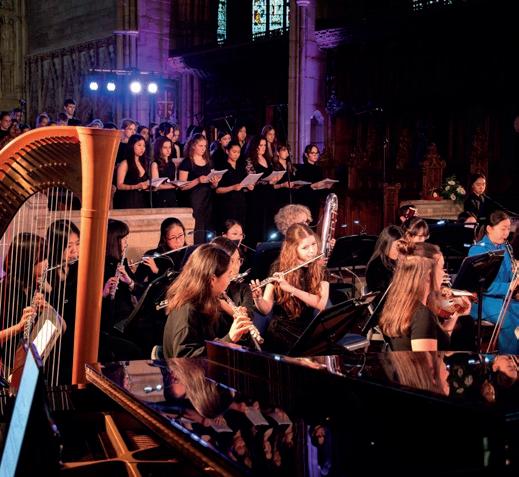


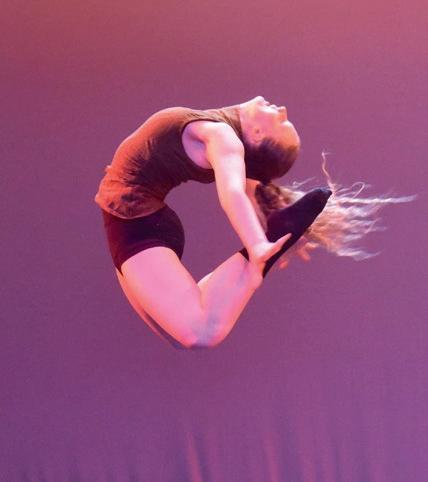
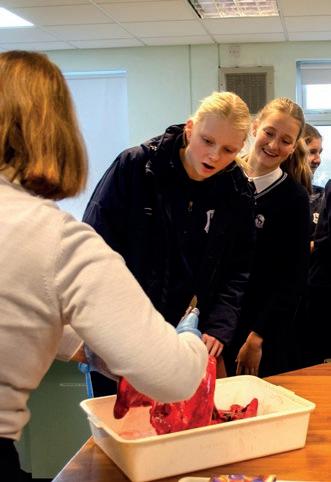

Head of Science:
Ms C Reesink-Wells
Science develops curiosity, problem-solving abilities, practical competency, independent thinking, and numeracy, alongside the confidence to take academic risks. The subject encompasses the study of the universe – from the largest galaxies to the smallest subatomic particles – exploring the foundations of life and making sense of the material world.
Science equips students with a broad range of transferable skills, regardless of their final A Level choices, and opens the door to diverse opportunities in higher education and beyond. These include careers in Scientific Research, Biochemistry, and Engineering, as well as Medicine, Finance, Government, and Media.
‘Science provides limitless potential for discovery and allows every one of us to explore the unknowns of the universe. Whether it is delving into the depths of physics, or investigating the intricate workings of the human body, science offers a vast array of subjects that enables me to expand my curiosity and challenge my understandings.’
Year 10 student
Students studying Science at Roedean are encouraged to bring curiosity, creativity, resilience, and a willingness to embrace challenges. Success in Science also requires strong organisation, persistence, and mathematical competence, alongside the ability to work both independently and collaboratively. Problem-solving is at the heart of scientific study, whether through ingenuity or perseverance, this skill will continue to develop as students work through the course. Students are inspired to enjoy the thrill of experimentation, the roar of the Bunsen flame, and even the occasionally sweet of otherwise, smell of their laboratory work.
At Roedean, all students study Biology, Chemistry, and Physics. They can choose either Separate Sciences (three IGCSEs, one in each subject) or Combined Science (two IGCSEs covering all three disciplines equally). While most students nationally take Combined Science, the majority of Roedean pupils opt for Separate Sciences, which includes more challenging content and provides excellent preparation for A Level Science. For those considering A Levels in any science subject, this route is strongly recommended; however, a Combined Science qualification does not prevent progression to A Level study. The decision about which route to take is made during the Year 9 options process.
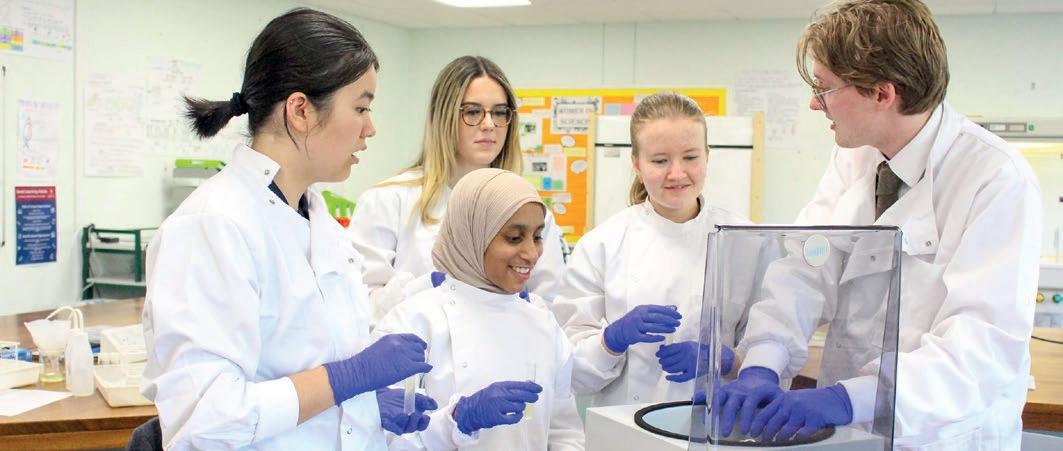
Head of Biology:
Dr C Turner
Exam Board:
Edexcel IGCSE 4BII
GCSE Biology serves as a gateway to a diverse array of educational and career pathways in the sciences and beyond. It provides a strong foundation for A Levels and university courses in subjects such as Medicine, Veterinary Science, Environmental Science, and Biotechnology. Beyond academia, it also supports careers in Healthcare, Research, Conservation, Forensic Science, Medical Writing, and more. Whether students are interested in understanding the human body, protecting the planet, or solving real-world problems through science, GCSE Biology offers the essential knowledge and skills to pursue these ambitions.w
Biology deals with the foundations of life. It surrounds us and affects us all. During the KS4 course you will develop a sound understanding of the processes of living things and the principles of carrying out good science experiments. During KS4 you will have the opportunity to take part in dissections and a variety of laboratory practical’s; we pride ourselves on giving you as many opportunities for practical work as possible. Biology will help you appreciate how society makes decisions about scientific issues, and how the sciences contribute to the world in which we live. The course is taught by teachers who are experienced, knowledgeable and passionate about their subject. This course will ignite your curiosity and inspire a love for biology.
Year 10:
• Plant and Human Nutrition
• Respiration
• Plant and Human Gas Exchange
• Plant and Human Transport
• Excretion
• Plant and Human Coordination and Control
Year 11:
• Plant and Human Reproduction
• DNA, Protein Synthesis and Inheritance
• Feeding relationships
• Ecology, cycles in ecosystems and human influences on ecosystems
• Selective breeding and genetic modification
• Cloning
• Food production
The department offers a variety of co-curricular clubs in Biology, including Dissect and Discover Club, MeDeVet+, and Microbiology Club. Students also have the opportunity to participate in the international Biology Challenge competition. Previous students have entered and won the Nancy Rothwell BioArtAttack Biological Drawing competition.
‘I really enjoy studying Biology because the teachers are so supportive and always happy to help if you don’t understand something. The practicals are one of my favourite parts –especially the dissections we’ve done this year. Dissecting the heart was really interesting and helped me properly understand how all the different parts work together. It made everything we’d learned in class actually make sense. I always look forward to Biology lessons –my teacher makes them really fun.’
Year 10 student.
Head of Chemistry:
Mrs P Barker
Exam Board:
Edexcel IGCSE 4CHI
The IGCSE Chemistry course fosters critical thinking, enhances problem-solving abilities, and strengthens analytical skills, preparing students not only for their exams but also for further education and real-world situations. These transferable skills make Chemistry students highly sought after. The Chemistry A Level provides an excellent progression from the GCSE course, offering a deeper exploration of concepts introduced in Years 10 and 11 while also presenting new material. Chemistry opens many pathways for further education and career opportunities. Graduates frequently pursue studies in Medicine, Veterinary Science, Dentistry, Natural Sciences, Engineering, Pharmacy, Forensics, Architecture, Accountancy, Law, Politics, as well as Chemistry itself.
Studying Chemistry enables students to understand the fundamental nature of matter. It creates a vital link between Biology and Physics, and by exploring the structure of atoms and molecules, it helps interpret and explain everyday phenomena. Chemistry reveals how substances react and form at the smallest scale, uncovering the invisible rules that govern the physical world.
The IGCSE Chemistry course provides an engaging and enjoyable progression from Key Stage Three. It raises awareness of the industrial, social, economic, environmental, and technological aspects of Chemistry, while deepening students’ understanding of the key principles of the subject.
‘I enjoy learning Chemistry at Roedean because it helps me understand how things work, such as why reactions happen or how everyday products are made. Chemistry is like solving puzzles, but with science. It’s made me appreciate how important chemistry is in things like medicine, the environment, and even the food we eat.’ Year 10 student.
The Edexcel IGCSE Chemistry course covers a broad range of topics, emphasising both knowledge and practical application. It includes a variety of dynamic and engaging practical activities that enable students to witness theory in action. Students will explore the formation of salts, the reasons behind the vibrant colours of fireworks, the process of making plastics, and how flavourings in sweets are created.
Year 10:
• Atomic Structure and Bonding
• The Periodic Table, Groups 1 and 7
• The Reactivity Series
• Extraction and Uses of Metals
• Gases in the Atmosphere
• Quantitative Analysis
• Qualitative Analysis
Year 11:
• Organic Chemistry
• Rates of Reaction
• Energetics
• Equilibrium
• Electrolysis
• Making Salts
Year 10 students are offered the opportunity to participate in the Royal Society of Chemistry Competition, where they work in groups of four to solve problems and think beyond the scope of the IGCSE course. This competition is both enjoyable and a valuable learning experience. Additionally, a team comprising students from Years 9 to 11 competes in the Royal Society of Chemistry’s “Top of The Bench” Competition, which challenges students with a variety of practical and theory-based tasks against peers from other schools.
The department also runs the Silver Crest Award for GCSE students, allowing them to plan and carry out their own science-based investigations.
Head of Physics:
Mr J Cronin
Exam Board:
Edexcel IGCSE 4PH
Physics is the study of the universe, from the largest galaxies to the smallest subatomic particles, and is essential for a deep understanding of the world around us. As the most fundamental science, it is expressed through the language of mathematics. Physicists are problem-solvers, and their skills are invaluable across all aspects of life. From engineering and technological innovation to medicine and the arts, no field remains untouched by Physics.
Physics opens a wide range of exciting opportunities, providing a strong foundation for further study in sciencerelated subjects such as A Level Physics, Engineering, or Computer Science. Beyond academia, it can lead to careers in aerospace, renewable energy, medicine, architecture, game development, and more. With its emphasis on problem-solving and analytical thinking, Physics is highly regarded by universities and employers, making it an excellent choice for students aspiring to careers in science and technology.
The Physics course develops students’ understanding of the fundamental concepts that explain how the world works, from the very small to the incredibly large. It explores everything from the forces that move objects to the energy that powers homes. Key topics include motion, electricity, waves, heat, magnetism, radioactivity, and the structure of the universe. Throughout the course, students learn to think scientifically by asking questions, solving problems, and using data to draw conclusions. Practical investigations play an essential role, helping students connect theory with real-world applications. Physics truly lies at the heart of everything.
This qualification builds valuable skills in analysis, reasoning, and mathematics, providing a strong foundation for A Levels, further science studies, or careers in technology, engineering, and beyond.
Year 10:
• Forces & Motion
• Energy & Energy Resources
• Electricity
• Radioactivity
Year 11:
‘Studying Physics has opened my eyes to how much there is still to discover, especially about space for example. It’s amazing to think that the same laws that explain how an apple falls can also explain how planets orbit the sun. Once you understand the laws behind how things move, how forces work, and how energy is transferred, you start to realise it’s everywhere—from how a car engine runs to how buildings stay up. It’s like learning the rules that shape the world, and that’s what makes it so powerful.’
Year 10 student
• Solids, liquids and gases
• Waves
• Electromagnetism
• Astrophysics.
The department offers a variety of opportunities beyond the classroom to foster students’ curiosity and deepen their understanding. Students can join the Astronomy Club, where, weather permitting, they have the chance to make real observations of the night sky. There is also a weekly Problem-Solving Club designed to support those interested in participating in various Olympiad competitions across year groups, or for anyone wanting to challenge themselves further and prepare for physics-related university courses. Additionally, students with an interest in engineering can take part in the F24 project, working as part of a team to design and modify a car, which is then raced at competition events.
Head of Spanish:
Mrs C Wilson
Exam Board:
Edexcel IGCSE 4SP1
Spanish is the third most widely spoken language in the world, with approximately 500 million speakers, following Mandarin Chinese and English. It is the official or primary language in 25 different countries. The language boasts a rich literary tradition, and Spanish-language films continue to receive critical acclaim both within the film industry and from audiences worldwide.
A Spanish degree typically involves compulsory study of the language throughout the course, focusing on comprehension, oral presentation, and grammar, especially in the early years. Hispanic Studies courses, a popular alternative to Spanish, offer a broader scope by covering the languages and cultures of not only Spain but also the Portuguese-speaking world, as well as regions such as Catalonia, Galicia, and the Basque Country. Both types of courses often include specialist language modules, such as business language and linguistics.
Graduates with degrees in Spanish or Hispanic Studies enjoy global opportunities, thanks to the widespread influence of the Spanish language. Linguists, in general, benefit from strong career prospects due to employers valuing their adaptability and communication skills.
Further Studies and Careers
Career paths for graduates include roles as translators and interpreters, language and ESL teachers, and professions in travel and tourism, international business, Law, Journalism, Finance, and the Civil Service.
Spanish is an invaluable asset in a student’s academic journey. As the third most commonly spoken language worldwide, students are more likely to use Spanish in their future lives than almost any other language.
The Spanish course covers a range of engaging topics including home and abroad, education and employment, personal life and relationships, the world around us, social activities, fitness, and health. Students develop skills across the four key areas: Speaking, Listening, Reading, and Writing, with each skill equally weighted at 25% of the total examination marks. All assessments are completed through terminal examinations.
• Reading - Understand and respond in writing to written Spanish.
• Writing - Communicate effectively in writing, using appropriate registers, a broad vocabulary, and accurate grammar and structures as outlined in the specification.
• Listening - Understand and respond in writing to spoken Spanish.
• Speaking - Communicate orally with a strong command of vocabulary and grammar, using them accurately.
Lessons are fast-paced and stimulating, with weekly opportunities to practice speaking skills with a Spanishspeaking language assistant. Students also benefit from access to online platforms such as Activelearn, The Language Gym, and Punto y Coma magazine to support independent learning and language practice outside the classroom.
Every two years, the Spanish Department organises a trip to Spain, providing students with the chance to immerse themselves in the culture and apply their language skills in real-life situations. This course not only develops linguistic and cultural understanding but also provides an excellent foundation for those wishing to continue Spanish at A level.
‘Learning Spanish at Roedean is great because it opens up so many opportunities to connect with people from different cultures. There are also a lot of opportunities to go on Spanish trips with the school, making it more fun and meaningful’
Faye
Director of Sport:
Mrs C Baker
Exam Board:
AQA 8582
Sport Science is an excellent choice for students seeking a well-rounded understanding of physical activity, health, and performance. It is particularly suitable for those who already compete or perform proficiently in one or more sports, as well as for students interested in the scientific principles underlying sport and athletic performance.
The course offers pupils the chance to perform and be assessed in three different sports or physical activities. Additionally, students analyse their own strengths and weaknesses in these performances as part of their nonassessed coursework. Sport Science also provides valuable insights into the wider impact of sport on people’s lives, including ethical issues such as the use of drugs in sport and the effects of inactivity and poor diet.
Studying Sport Science at GCSE lays a strong foundation for further study at A Level or BTEC within Roedean. Many pupils who continue with Sport Science at A Level go on to pursue related university courses, where they explore more deeply the physiology, anatomy, and theoretical aspects of sports and athletic performance.
GCSE Sport Science enables students to develop important skills in data analysis, presentation, and communication. It also encourages the exploration of problem-solving and teamwork abilities, all of which are highly transferable to other subjects and future career paths.

The specification is broad, covering topics such as anatomy, physiology, sport psychology, and socio-cultural issues in sport. This helps pupils understand the science and history behind sport. The knowledge gained is valuable for personal fitness, health, and wellbeing, while also providing a solid foundation for future study in Sport and Exercise Science fields, such as at A Level or university. Lessons are primarily theory-based, with some opportunities for practical learning in certain units.
Paper 1 – Human Body and Movement in Physical Activity and Sport
What is assessed:
• Applied anatomy and physiology
• Movement analysis
• Physical training
• Use of data
How is it assessed:
• Written exam: 1 hour 15 minutes
• 78 marks
• 30% of GCSE
Paper 2 – Socio-Cultural Influences and Well-being in Physical Activity and Sport
What is assessed:
• Sports psychology
• Socio-cultural influences
• Health, fitness, and wellbeing
• Use of data
How is it assessed:
• Written exam: 1 hour 15 minutes
• 78 marks
• 30% of GCSE
Non-Exam Assessment: Practical Performance in Physical Activity and Sport
• Practical performance in three different physical activities as a player/performer
• Analysis and evaluation of performance to bring about improvement in one activity
How is it assessed:
Pupils must be assessed in skills during progressive drills and within the full context of their chosen sports or activities for each of the three activities.
We are looking at organising a new trip to Brighton University for Year 10 Sport Science students. On this trip, students will be able to undergo fitness testing using the universities facilities which will consolidate knowledge and understanding of the content taught in the specification whilst being overseen by university lecturers. Costing is to be confirmed.
‘I have really enjoyed learning about everything in the Sports Science specification. It compliments Biology really well, ignoring the plant aspect, and relates everything to sports. With the two different papers, there is a lot of variety, from anatomy to psychology. The practical aspect allows me to learn about my strengths and weaknesses and create a plan of improvement to which I can apply the knowledge that I learned in the classroom. I highly recommend it, to anyone who loves sports and or Biology.’
Clara
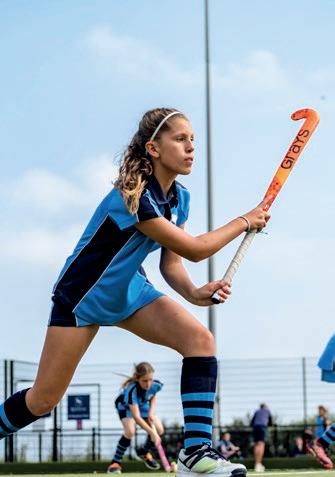

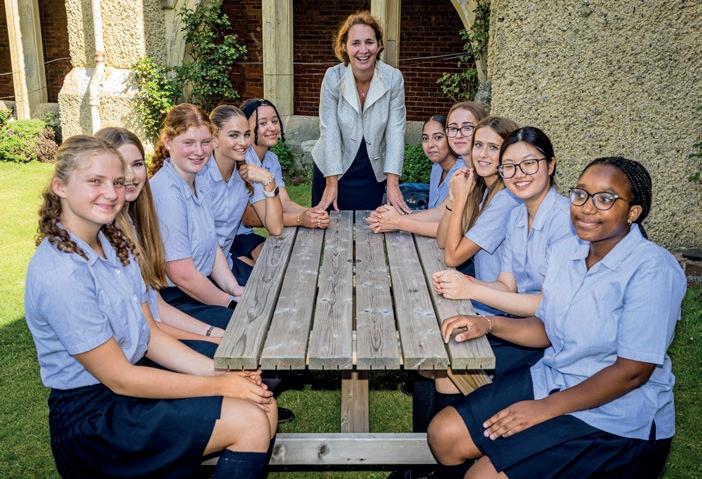

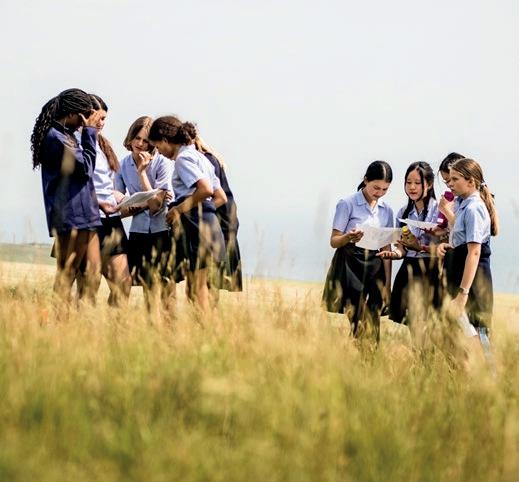
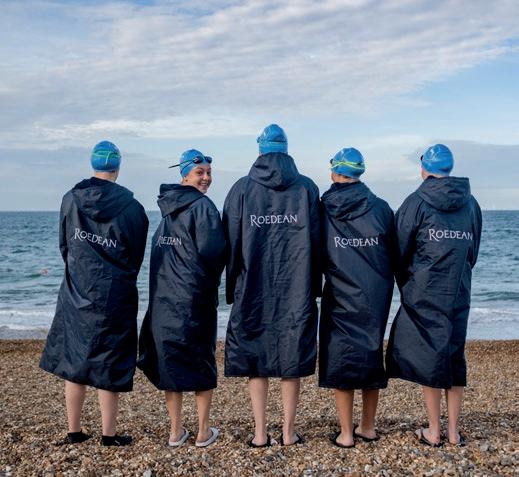
+44(0)1273 667500 roedean.co.uk
Charity No.: 307063